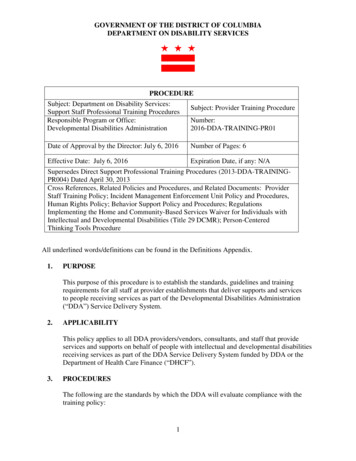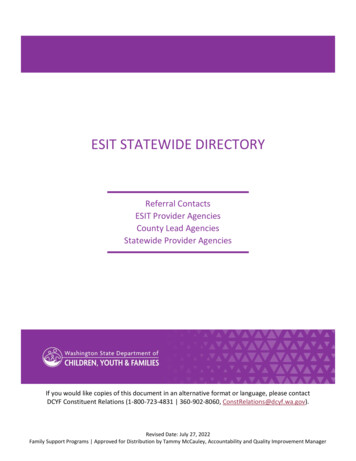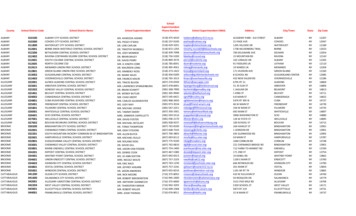
Transcription
GOVERNMENT OF THE DISTRICT OF COLUMBIADEPARTMENT ON DISABILITY SERVICESPROCEDURESubject: Department on Disability Services:Subject: Provider Training ProcedureSupport Staff Professional Training ProceduresResponsible Program or Office:Number:Developmental Disabilities Administration2016-DDA-TRAINING-PR01Date of Approval by the Director: July 6, 2016Number of Pages: 6Effective Date: July 6, 2016Expiration Date, if any: N/ASupersedes Direct Support Professional Training Procedures (2013-DDA-TRAININGPR004) Dated April 30, 2013Cross References, Related Policies and Procedures, and Related Documents: ProviderStaff Training Policy; Incident Management Enforcement Unit Policy and Procedures,Human Rights Policy; Behavior Support Policy and Procedures; RegulationsImplementing the Home and Community-Based Services Waiver for Individuals withIntellectual and Developmental Disabilities (Title 29 DCMR); Person-CenteredThinking Tools ProcedureAll underlined words/definitions can be found in the Definitions Appendix.1.PURPOSEThis purpose of this procedure is to establish the standards, guidelines and trainingrequirements for all staff at provider establishments that deliver supports and servicesto people receiving services as part of the Developmental Disabilities Administration(“DDA”) Service Delivery System.2.APPLICABILITYThis policy applies to all DDA providers/vendors, consultants, and staff that provideservices and supports on behalf of people with intellectual and developmental disabilitiesreceiving services as part of the DDA Service Delivery System funded by DDA or theDepartment of Health Care Finance (“DHCF”).3.PROCEDURESThe following are the standards by which the DDA will evaluate compliance with thetraining policy:1
A. Phase I – Overview/Employee Orientation1. Approved Trainer(s): The provider shall designate one or more mid-levelmanager staff position(s) to be responsible for coordinating staff training.The employee responsible for staff training should have broad knowledge ofsupport and service needs of people with intellectual disabilities and possessthe necessary skills to organize and implement a training program. Theprovider shall ensure that the approved trainer(s) is (are) competent toprovide each employee with initial and continuous training that enables theemployee to perform his or her duties effectively, efficiently, andcompetently.The approved trainer must have a minimum of three (3) years of experienceproviding direct supports, or specific expertise/certification in the subjectmatter in order to verify competency to train staff.The approved trainer must have completed DDA Person-Centered Thinking(“PCT”) training or PCT training which is otherwise consistent with theLearning Community Curriculum (http://www.learningcommunity.us/). Thetrainer must have completed PCT training within the last three (3) years orwithin six (6) months of the approval date of these procedures.2. Phase I Training Requirements: The following are required of Phase Itraining:a. DDS Approved TrainingThe following nine (9) modules make up the DDS approved trainingfor Phase I. These include: Introduction to Developmental Disabilities; Health and Wellness; Adaptive Equipment; Introduction to Human Rights; Universal Precautions and General Safety Guidelines; Incident Management Test; A Blueprint for Service (*Members of the Provider Coalitionare exempt from taking this training); Making Friends and Building Relationships; and Quality of Life.b. Providers Philosophies, Policies, Procedures, Goals, and Services& Practices.The provider shall establish a written training plan and/or policiesand procedures to maintain compliance with this standard. This planmust show how the training will be provided to staff and the areascovered, including a calendar which identifies, at a minimum, thetraining date, time, location and approved trainer.3. All new hires in direct support roles, not limited to Direct Support2
Professionals (“DSPs”), must complete Phase I training prior to workingindependently with people who receive supports from DDA.4. In order to show evidence of completion of Phase I training, providers musthave paper or electronic records that include the title/subject of each trainingmodule, signature of the supervisor or approved trainer, and signature ofeach staff person who completed the training.5. In order to have proof of proficiency in Phase I training, the records mustinclude competency verification based on a passing score or measuredesignated by the trainer.B. Phase II – On-going/Person-Centered Training1. Approved Trainer(s): Qualified Trainers for Phase II include clinicians,Qualified Intellectual Disabilities Professional (“QIDPs”), RegisteredNurses or family members with experience in care of the person. Eachapproved trainer must have knowledge and expertise in the specific needs ofthe person.2. Phase II Training Requirements: Phase II training shall include training onthe specific needs of the person and may include, but not be limited to, oneor more of the following if necessary to support the person: Health Care Management Plan (“HCMP”);Health Passport;Individual Support Plan (“ISP”);Behavior Support Plan (“BSP”);Individual Program Plan (“IPP”);Teaching strategies;Personal Emergency Preparedness Plan (“PEP”);Nutrition;Specialized dining techniques;Transfer and mobility procedures:Seizure disorders/protocols;Adaptive equipment; andMedications/side effects, etc.3. All staff in direct support roles, not limited to DSPs, must complete Phase IItraining prior to working alone with a person (if a new hire) and on-going aschanges occur in the person’s support needs as identified in the person’s ISPor BSP. Family members who are experienced in the care of the person areexempt from taking Phase II training.4. Evidence of Phase II training must include records showing the initials ofthe person that the specialized in-service training focuses upon; signature of3
the supervisor or experienced staff member facilitating the training session;and the signature of the staff member attending. If group training isconducted, it must be clear that the training content is individualized to theunique needs of people the staff person in attendance is supporting.5. Proof of proficiency in Phase II training shall be evidenced by records thatshow each staff person received on-the-job training on each person’sindividualized support needs.C. Phase III – Annual Trainings/Certification Renewals1. Approved Trainer(s): Phase III training shall be conducted by professionalsor nationally accredited institutions with expertise in providing certificationon the subject area.2. Required annual trainings or certifications prior to working with the personinclude certifications or trainings in the following areas: CPR via in person class;First Aid;Universal precautions and infection control that meets theOccupational Safety and Health Administration (“OSHA”)requirements;Behavioral Intervention Procedures (e.g. Mandt, CPI, or PositiveBehavior Strategies), where applicable;OSHA requirements for people who may be exposed to hazardouschemicals;Fire and safety precautions;Health Insurance Portability and Accountability Act (“HIPAA”)training and guidelines to maintain confidentiality;Medication Administration (TME Certification), where applicable;DDS Adaptive Equipment Maintenance Protocol; andRecognition of, prevention of and obligation to report abuse, neglect,exploitation and serious physical injury (per the DDS-approvedIncident Management and Enforcement Unit manual).3. Phase III training is required annually and certifications should remainactive.4. Evidence/records of Phase III training must include the name of the trainee,the name of the trainer, the name of the organization sponsoring the training,title of the training, date of the training, and the duration of the training inhours.D. Phase IV – Professional Development/Continuing Education4
1. Approved Trainer(s): Phase IV training shall be conducted by professionalsor nationally accredited institutions with expertise in providing trainings onthe subject area.2. Phase IV training is required of all staff with direct support roles and shallbe maintained on annual basis or at the person’s anniversary date of hire.3. Each staff in a direct support role is required to complete fifteen (15) hoursof professional development/continued education training except membersof the Provider Coalition who are required to complete ten (10) hours.4. Evidence/records of Phase IV training should include one or more of thefollowing: certificate of completion, training materials or hand-outs from thetraining session, proof of attendance; and/or confirmation of registration tothe training.E. Other Training Requirements1. Provider Owner-Operator, Executive Staff & Program Managersa. Owners-operators, executive staff and program managers of provideragencies in the Home and Community-Based Services Waiver forIndividuals with Intellectual and Developmental Disabilities(“HCBS/IDD”) waiver program or Intermediate Care Facilities(“ICF”) are required to take training in the following: Person-CenteredThinking, Supporting Community Integration (Discovery), SupportedDecision Making, Job Search/Community Participation Plan, and othertopics determined by DDS.b. Evidence and records of management/executive staff training shallinclude records of attendance, name of the person attending, date andtime of the training, and title/subject of the training.c. HCBS waiver program providers are required to complete this trainingby September 30, 2016, and all ICF providers are required to completethis training by one (1) year of the effective date of these procedures.2. Staff of Individualized Day Supportsa. Provider staff of Individualized Day Supports (IDS) providers arerequired to complete mandatory orientation offered by the providerand consistent with the “Train the Trainer” course offered by the IDSProviders Community of Practice. The course must include theCommunity Mapping and the Supporting People to Use PublicTransportation trainings and may include other trainings specific toIDS.5
b. Evidence and record of training shall include results of a providerdeveloped proficiency test conducted at the conclusion of eachtraining session.6
DDS Adaptive Equipment Maintenance Protocol; and Recognition of, prevention of and obligation to report abuse, neglect, exploitation and serious physical injury (per the DDS-approved Incident Management and Enforcement Unit manual). 3. Phase III training is required annually and certifications should remain active. 4.











